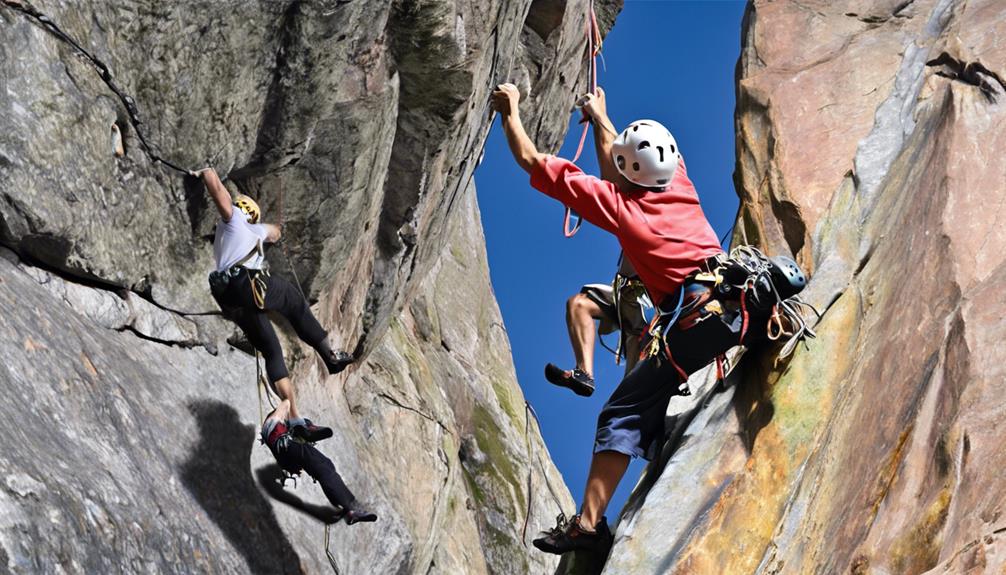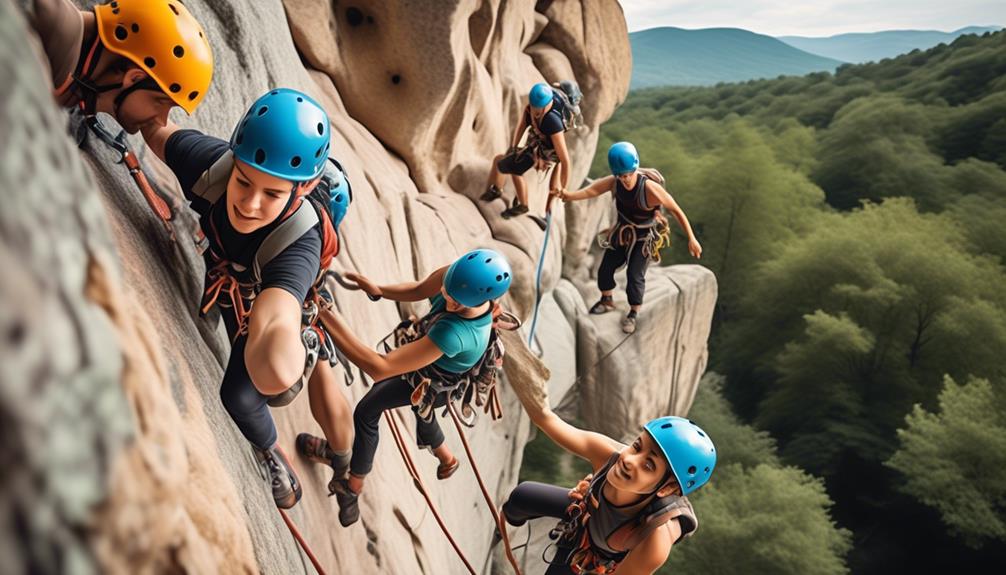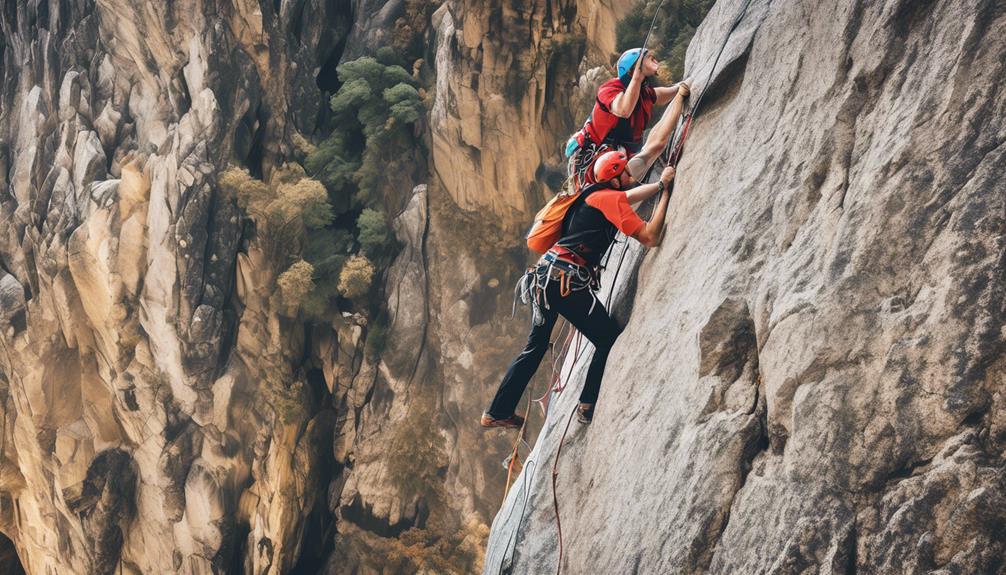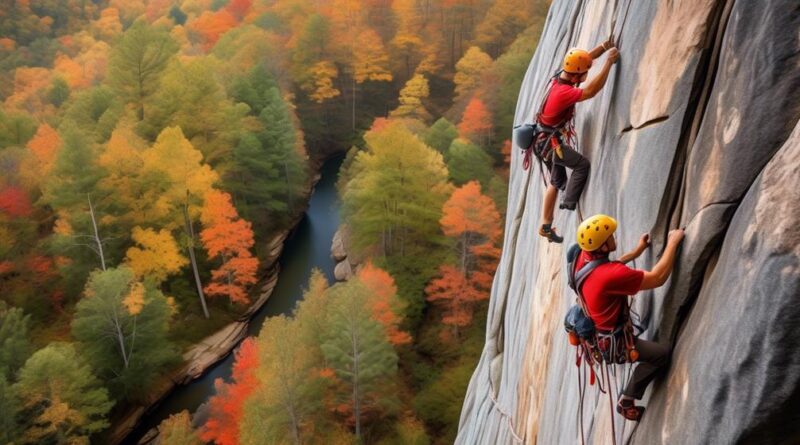Top Rock Climbing Holidays for Novice Adventurers
If you're one of the millions of people who have recently taken up rock climbing, you're not alone. In fact, rock climbing has seen a significant surge in popularity in recent years, with a 10% increase in the number of participants just in the past year.
But with so many options out there, it can be overwhelming to decide where to go for your next climbing adventure. From the picturesque cliffs of Thailand to the rugged mountains of Colorado, there are countless destinations to explore.
Whether you're looking for a short weekend getaway or an extended expedition, the world is your oyster when it comes to rock climbing holidays for novice adventurers. So, where should you start?
Best Rock Climbing Destinations for Beginners
For novice rock climbers, consider starting your journey at well-known beginner-friendly destinations such as Joshua Tree National Park in California or the Peak District in the United Kingdom. These locations offer a variety of routes suitable for beginners and are great places to learn about rock climbing etiquette.
When you start climbing, it's important to be mindful of other climbers and the natural environment. Always be courteous and respectful, and follow any specific rules or guidelines set by the climbing area.
Additionally, it's crucial to take care of your body by paying attention to climbing nutrition. As you exert a lot of energy during climbs, it's essential to fuel your body with the right nutrients. Make sure to stay hydrated and consume snacks that provide sustainable energy to keep you going throughout your climbs.
Learning and following rock climbing etiquette not only ensures a positive experience for yourself but also contributes to the overall well-being of the climbing community and the environment. Similarly, paying attention to climbing nutrition can enhance your performance, prevent injuries, and help you enjoy your climbing adventures to the fullest.
Essential Gear for Novice Climbers
Consider the essential gear you'll need as you embark on your rock climbing journey, starting with reliable and properly fitted climbing shoes. Climbing shoe recommendations for novice climbers include brands like La Sportiva, Scarpa, and Five Ten. These shoes are designed to provide the necessary grip and support for various types of rock surfaces. It's essential to prioritize comfort and fit when selecting climbing shoes, as they directly impact your performance and safety on the rock.
In addition to climbing shoes, beginner gear packages are an excellent option to kickstart your climbing endeavors. These packages typically include a harness, a belay device, a chalk bag, and a helmet. Look for a harness that's adjustable and comfortable for extended wear during climbs. A reliable belay device is crucial for rope management and safety while climbing. A chalk bag is essential for keeping your hands dry and improving your grip, especially during longer climbs. Lastly, a well-fitted helmet is non-negotiable for protecting your head from potential rockfall or accidental impacts.
As a novice climber, it's important to invest in quality gear that meets safety standards and suits your specific needs. While it can be tempting to borrow or rent equipment, having your own gear ensures proper fit and familiarity with your equipment, contributing to a safer and more enjoyable climbing experience.
Top Rock Climbing Schools for Beginners

If you're a novice adventurer looking to learn rock climbing from experienced professionals, consider enrolling in one of the top rock climbing schools for beginners. These schools provide comprehensive training and guidance to ensure that you learn the essential skills and safety measures for rock climbing.
When choosing a rock climbing school, it's important to consider the quality of instruction, the instructor-to-student ratio, and the types of climbing equipment available for practice.
One of the key aspects of a reputable rock climbing school is its focus on climbing safety. Look for schools that prioritize safety protocols and provide thorough instruction on how to properly use rock climbing equipment. This includes learning about harnesses, ropes, carabiners, and other essential gear. Additionally, reputable schools will also cover important safety techniques such as belaying, proper foot and hand placement, and how to assess climbing routes for potential hazards.
Another crucial factor to consider when selecting a rock climbing school is the opportunity for hands-on practice. Look for schools that offer plenty of practical experience on real rock faces under the supervision of experienced instructors. This practical training will allow you to apply what you've learned about climbing safety and equipment in a real-world setting, helping you build confidence and competence as a beginning rock climber.
Beginner-Friendly Climbing Routes and Trails
When planning your rock climbing holiday as a novice adventurer, seek out beginner-friendly climbing routes and trails that offer a safe and enjoyable experience for your skill level. Before embarking on your climbing adventure, it's essential to ensure that you have the right climbing equipment. A well-fitting harness, sturdy climbing shoes, a chalk bag, and a properly rated rope are crucial for a safe and successful climb. If you're new to climbing, consider renting equipment from a reputable outdoor gear store or climbing center to ensure you have the appropriate gear.
As a beginner, mastering essential climbing techniques is key to navigating beginner-friendly routes. Start by learning how to tie essential knots such as the figure-eight knot and the double fisherman's knot. Additionally, understanding basic climbing movements, such as smearing, edging, and using handholds and footholds effectively, will be invaluable as you tackle beginner routes. Enrolling in a beginner-friendly climbing course or hiring a certified guide can provide you with the necessary instruction to develop these fundamental skills. Learning and practicing these techniques in a controlled environment will boost your confidence and prepare you for the challenges of outdoor climbing.
When selecting beginner-friendly climbing routes and trails, consider the level of difficulty, terrain, and the presence of experienced climbers or guides. Look for routes with clear markings and well-maintained trails to ensure a safe and enjoyable experience. By prioritizing safety, acquiring the right equipment, and honing fundamental climbing techniques, you'll set yourself up for a rewarding and memorable rock climbing holiday.
Safety Tips for Novice Climbers

Ensure your climbing safety by mastering essential techniques and equipping yourself with the right gear.
Before venturing outdoors, it's crucial for novice climbers to gain experience and confidence in a climbing gym. The controlled environment of a climbing gym allows you to practice essential climbing skills and learn proper etiquette, such as yielding to other climbers and communicating effectively with your belayer. Additionally, it's important to familiarize yourself with the gym's safety protocols and procedures, as they'll provide a solid foundation for your outdoor climbing endeavors.
When it comes to gear, proper footwear is essential for a safe and enjoyable climbing experience. Invest in a pair of climbing shoes that fit snugly without causing discomfort. The right footwear will provide the necessary grip and support for your feet, allowing you to confidently navigate various rock surfaces. Furthermore, consider the type of climbing you'll be doing and choose shoes that are suitable for the terrain and conditions you'll encounter.
In addition to footwear, harnesses, ropes, and helmets are vital pieces of safety equipment. Ensure that your gear is in good condition and properly maintained. Before every climb, conduct thorough safety checks on your gear and partner to minimize the risk of accidents.
Top Rock Climbing Tours for Beginners
Embark on an unforgettable journey as a novice climber by exploring top rock climbing tours designed for beginners. Rock climbing vacation packages catered specifically for beginners are the perfect way to dive into this thrilling sport. These package deals often include expert guides, necessary equipment, and carefully selected climbing routes to ensure a safe and enjoyable experience for those new to the sport.
Rock climbing for beginners package deals are available in various breathtaking locations around the world. Whether you dream of scaling the iconic cliffs of Yosemite National Park, exploring the rugged beauty of the Scottish Highlands, or discovering the stunning rock formations in Kalymnos, Greece, there's a perfect beginner-friendly rock climbing tour for you. These tours are meticulously designed to introduce newcomers to the fundamentals of rock climbing while providing a memorable and exhilarating adventure.
When choosing a rock climbing vacation package, look for tours that offer comprehensive instruction for beginners. Expert guides will teach you essential skills such as proper climbing techniques, equipment usage, and safety procedures. Additionally, these tours often provide a supportive and encouraging environment, allowing novice climbers to build confidence as they conquer new challenges.
Choosing the Right Climbing Partner

A successful rock climbing experience often hinges on finding a compatible and reliable climbing partner. When choosing the right climbing partner, consider the following:
- Compatibility is Key: Look for a partner who shares similar goals, climbing style, and fitness level as you. Compatibility ensures a smoother and more enjoyable climbing experience.
- Seek Experienced Partners: Climbing with someone who's more experience can enhance your skills and safety. An experienced partner can offer guidance, share valuable knowledge, and help navigate challenging routes.
- Effective Communication is Crucial: Find a partner with whom you can communicate openly and effectively. Clear communication is essential for coordinating movements, sharing concerns, and making decisions while on the rock.
- Trust Building Strategies: Prioritize building trust with your climbing partner. Participating in trust-building exercises, discussing safety protocols, and sharing personal climbing experiences can help foster a trusting relationship.
- Consistent Reliability: Look for a partner who's reliable and committed. Reliability ensures that you can count on your partner to adhere to plans, follow safety protocols, and provide support when needed.
Choosing the right climbing partner is a crucial decision that can significantly impact your climbing experience. By finding a compatible, experienced partner and employing effective communication and trust-building strategies, you can enhance safety, enjoyment, and skill development during your rock climbing adventures.
Beginner-Friendly Climbing Techniques
When starting your rock climbing journey as a novice, it's important to focus on mastering beginner-friendly climbing techniques to build a strong foundation for your skills. To begin with, understanding basic climbing equipment is crucial. Harness, helmet, climbing shoes, and a chalk bag are essential. It's important to learn how to properly wear and use this equipment for your safety and comfort.
Now, let's delve into some climbing technique tips.
Firstly, footwork is key. As a beginner, it's common to rely heavily on your arms, but efficient climbing actually starts from the ground up. Placing your feet carefully and using them to support your body weight can make a significant difference in your climbing ability.
Next, focus on your hand grip. It's tempting to grip holds tightly, but this can lead to premature fatigue. Instead, practice using a relaxed grip and only tighten when necessary.
Additionally, mastering the art of balance will greatly benefit your climbing. Learning to shift your weight and center of gravity effectively will help you conserve energy and tackle routes more efficiently.
Frequently Asked Questions
Are There Any Age Restrictions for Participating in Beginner-Friendly Rock Climbing Tours or Schools?
There are usually age restrictions for beginner-friendly rock climbing tours or schools. Always check with the specific tour or school for their age requirements before signing up. It's important to ensure you meet the criteria.
What Are Some Common Mistakes That Novice Climbers Should Avoid to Ensure Their Safety?
To ensure your safety while rock climbing, avoid common mistakes like neglecting to check your gear, not communicating effectively with your climbing partner, and rushing through safety protocols. Remember to always double-check your knots and harness.
Are There Any Specific Dietary Considerations or Recommendations for Novice Climbers Before a Climbing Trip?
Before a climbing trip, consider dietary considerations and pre-climbing nutrition. Fuel up with complex carbs and protein for sustained energy. Stay hydrated and pack essential gear for safety. Prioritize safety precautions and enjoy the adventure!
What Are Some Lesser-Known Beginner-Friendly Climbing Routes or Trails That Offer Unique Experiences?
When looking for unique climbing destinations, consider lesser-known routes like the Red River Gorge in Kentucky or Kalymnos in Greece. For safety tips, always check equipment and weather conditions, and take lessons from experienced guides.
How Can Novice Climbers Find and Connect With Experienced Climbing Partners in Their Local Area?
To find climbing partners, connect with local climbing communities through social media or local gyms. Attend meetups and ask for recommendations. Ensure safety by double-checking gear and discussing climbing experience. Get gear recommendations from experienced climbers.
Conclusion
Now that you have all the information you need, it's time to start planning your rock climbing adventure!
Whether you choose to visit a top climbing destination, enroll in a climbing school, or join a guided tour, remember to prioritize safety and have fun.
With the right gear, techniques, and climbing partner, you'll be well on your way to enjoying the thrill of rock climbing as a novice adventurer.
